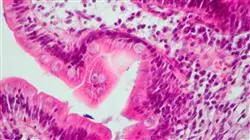University certificate
The world's largest faculty of medicine”
Introduction to the Program
Improve your knowledge in Pediatric Gastroenterology and Hepatology through this program, where you will find the best teaching material, with real clinical cases. Learn here about the latest advances in the specialty to be able to perform a quality medical practice"

The program is designed to provide an online qualification equivalent to 60 ECTS credits and 1,500 hours of study, and all theoretical and practical knowledge is presented through high-quality multimedia content, analysis of clinical cases prepared by experts, master classes and video techniques, allowing the exchange of knowledge and experience, maintaining and updating the level of specialization of its members, creating protocols for action and disseminating the most important developments in the specialty. With the online program, students can organize their time and pace of learning, adapting it to their schedules, in addition to being able to access the contents from any computer or mobile device.
Given the growing number of publications that are published daily at the international level in the field of study of the specialty, it is difficult to keep up to date in an adequate manner.
The objective of the Professional master’s degree in Advances in Pediatric Gastroenterology and Hepatology is to cover the updating needsof professionals interested in the field, seeking usefulness in routine clinical practice, and to encourage high-level research in the aspects covered.
Update your knowledge through the Professional Master's Degree in Pediatric Gastroenterology and Hepatology"Professional master’s degree
This Professional master’s degree in Advances in Pediatric Gastroenterology and Hepatology contains the most complete and up-to-date scientific program on the market. Its most notable features are:
- More than 75 clinical cases presented by experts in Pediatric Gastroenterology and Hepatology
- The graphic, schematic, and practical contents with which they are created provide scientific and practical information on the disciplines that are essential for professional practice
- Diagnostic-therapeutic developments on assessment, diagnosis, and treatment in Pediatric Gastroenterology and Hepatology
- Contains practical exercises where the self-evaluation process can be carried out to improve learning
- Iconography of clinical and diagnostic imaging tests
- An algorithm-based interactive learning system for decision-making in the clinical situations presented throughout the course
- With special emphasis on evidence-based medicine and research methodologies in Pediatric Gastroenterology and Hepatology
- All of this will be complemented by theoretical lessons, questions to the expert, debate forums on controversial topics, and individual reflection assignments
- Availability of content from any fixed or portable device with internet connection
This Professional Master's Degree is the best investment you can make when selecting a refresher program, for two reasons: in addition to updating your knowledge in Pediatric Gastroenterology and Hepatology, you will obtain a Professional master’s degree from TECH Global University”
The teaching staff includes professionals from the field of Pediatric Gastroenterology and Hepatology, who bring their experience to this program, as well as renowned specialists from leading scientific societies.
The multimedia content, developed with the latest educational technology, will provide the professional with situated and contextual learning, i.e., a simulated environment that will provide an immersive training program designed to train in real situations.
This program is designed around Problem-Based Learning, whereby the physician must try to solve the different professional practice situations that arise throughout the program. For this purpose, the physician will be assisted by an innovative interactive video system created by renowned and experienced experts in the field of Pediatric Gastroenterology and Hepatology with extensive teaching experience.
This Professional master’s degree offers specialization in simulated environments, which provides an immersive learning experience designed to train for real-life situations"

It includes clinical cases to bring the program as close as possible to the reality of medical care"
Why study at TECH?
TECH is the world’s largest online university. With an impressive catalog of more than 14,000 university programs available in 11 languages, it is positioned as a leader in employability, with a 99% job placement rate. In addition, it relies on an enormous faculty of more than 6,000 professors of the highest international renown.

Study at the world's largest online university and guarantee your professional success. The future starts at TECH”
The world’s best online university according to FORBES
The prestigious Forbes magazine, specialized in business and finance, has highlighted TECH as “the world's best online university” This is what they have recently stated in an article in their digital edition in which they echo the success story of this institution, “thanks to the academic offer it provides, the selection of its teaching staff, and an innovative learning method aimed at educating the professionals of the future”
A revolutionary study method, a cutting-edge faculty and a practical focus: the key to TECH's success.
The most complete study plans on the university scene
TECH offers the most complete study plans on the university scene, with syllabuses that cover fundamental concepts and, at the same time, the main scientific advances in their specific scientific areas. In addition, these programs are continuously being updated to guarantee students the academic vanguard and the most in-demand professional skills. In this way, the university's qualifications provide its graduates with a significant advantage to propel their careers to success.
TECH offers the most comprehensive and intensive study plans on the current university scene.
A world-class teaching staff
TECH's teaching staff is made up of more than 6,000 professors with the highest international recognition. Professors, researchers and top executives of multinational companies, including Isaiah Covington, performance coach of the Boston Celtics; Magda Romanska, principal investigator at Harvard MetaLAB; Ignacio Wistumba, chairman of the department of translational molecular pathology at MD Anderson Cancer Center; and D.W. Pine, creative director of TIME magazine, among others.
Internationally renowned experts, specialized in different branches of Health, Technology, Communication and Business, form part of the TECH faculty.
A unique learning method
TECH is the first university to use Relearning in all its programs. It is the best online learning methodology, accredited with international teaching quality certifications, provided by prestigious educational agencies. In addition, this disruptive educational model is complemented with the “Case Method”, thereby setting up a unique online teaching strategy. Innovative teaching resources are also implemented, including detailed videos, infographics and interactive summaries.
TECH combines Relearning and the Case Method in all its university programs to guarantee excellent theoretical and practical learning, studying whenever and wherever you want.
The world's largest online university
TECH is the world’s largest online university. We are the largest educational institution, with the best and widest online educational catalog, one hundred percent online and covering the vast majority of areas of knowledge. We offer a large selection of our own degrees and accredited online undergraduate and postgraduate degrees. In total, more than 14,000 university degrees, in eleven different languages, make us the largest educational largest in the world.
TECH has the world's most extensive catalog of academic and official programs, available in more than 11 languages.
Google Premier Partner
The American technology giant has awarded TECH the Google Google Premier Partner badge. This award, which is only available to 3% of the world's companies, highlights the efficient, flexible and tailored experience that this university provides to students. The recognition as a Google Premier Partner not only accredits the maximum rigor, performance and investment in TECH's digital infrastructures, but also places this university as one of the world's leading technology companies.
Google has positioned TECH in the top 3% of the world's most important technology companies by awarding it its Google Premier Partner badge.
The official online university of the NBA
TECH is the official online university of the NBA. Thanks to our agreement with the biggest league in basketball, we offer our students exclusive university programs, as well as a wide variety of educational resources focused on the business of the league and other areas of the sports industry. Each program is made up of a uniquely designed syllabus and features exceptional guest hosts: professionals with a distinguished sports background who will offer their expertise on the most relevant topics.
TECH has been selected by the NBA, the world's top basketball league, as its official online university.
The top-rated university by its students
Students have positioned TECH as the world's top-rated university on the main review websites, with a highest rating of 4.9 out of 5, obtained from more than 1,000 reviews. These results consolidate TECH as the benchmark university institution at an international level, reflecting the excellence and positive impact of its educational model.” reflecting the excellence and positive impact of its educational model.”
TECH is the world’s top-rated university by its students.
Leaders in employability
TECH has managed to become the leading university in employability. 99% of its students obtain jobs in the academic field they have studied, within one year of completing any of the university's programs. A similar number achieve immediate career enhancement. All this thanks to a study methodology that bases its effectiveness on the acquisition of practical skills, which are absolutely necessary for professional development.
99% of TECH graduates find a job within a year of completing their studies.
Professional Master's Degree in Advances in Pediatric Gastroenterology and Hepatology
Modern gastroenterology and hepatology in pediatric contexts currently stands as one of the most evolving branches of medicine in recent times, highlighting mainly by the innovative technological implementations, both diagnostic and surgical, which take place with some frequency in this area of health. Understanding the need for academic updating that accompanies the development of the area, at TECH Global University we have prepared our Professional Master's Degree program in Advances in Pediatric Gastroenterology and Hepatology, focused on the training of professionals adapted to the current requirements and trends of the sector. This postgraduate course pays special attention to the possibilities surrounding the new implementations of gastroenterological care practice and delves into the modernization of aspects such as: the particularities corresponding to the use of diagnostic methods such as narrow band endoscopy or fluorescence endoscopy; the knowledge of the different applications of genetics in the field of pediatric gastroenterology and the technical or methodological indications to be taken into account when performing an intestinal transplant, as well as its subsequent post-surgical care.
Study an Online Professional Master's Degree in Digestive Endoscopy
Endoscopic advances stand out as one of the most significant practical implementations in the area of modern gastroenterology, being necessary for specialized professionals to be up to date in the new possibilities and technological peculiarities surrounding this practice. In our Professional Master's Degree program, you will acquire a series of theoretical and practical knowledge that will allow you to optimally face the current challenges of modern gastroenterology, covering the updating of concepts such as: the technical peculiarities of esophago-gastroscopy and colonoscopy procedures in the detection of digestive pathologies in pediatric patients; and the knowledge of the possibilities present in nutritional treatments for the implementation of probiotics in the care of inflammatory bowel disease.







